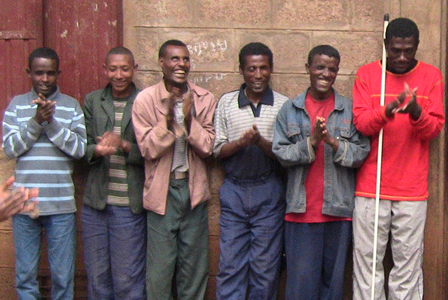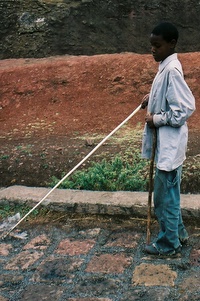

 |
 |
 |

From Mr. Belaye Tsegaye Drese
It all began when my sister in law traveled back to Ethiopia for her wedding in December 2005. Upon her safe arrival in Addis Ababa, she related to my wife a sad story of the lamentable living condition of the poor people. This immediately brought back one sad memory of my boyhood.
As a young boy growing up in rural Ethiopia, I used to follow my mother when she went to the market place to buy grain and some food items for the family.
There was a particular scene that used to draw my attention as we walked to the market place. It was the scene of blind beggars sitting or standing on each side of the street with stretched hands and begging passersby for money. They recited again and again a poetic phrase in Amharic that left an indelible mark in my mind. A contextual translation of the phrase runs thus:
"How the day goes by and
The night swiftly draws in without me,
Not once being able to see a glimpse of daylight.
Please for light's sake, DON'T PASS ME BY!"
This phrase and the voice that expressed it haunted me most of the night. In fact, at 2am in the morning I got off my bed and quietly walked to the family room to pray. In my prayer, I asked the Lord why I was feeling such a deep concern for this people and whether or not He wanted me to help them in any way. I concluded my prayer by further asking Him to provide the means, if indeed he was prompting me to become one of His vessels of help to them.
A year later, I had to travel to Ethiopia myself on account of my mother's sickness. After seeing to my mother's medical needs, I contacted the local pastor and asked him how the blind people of my hometown, Debremarkos, were doing and whether or not they were being helped. His response was not unexpected. He said even though his church had all the will to offer some help to this people, due to their own extremely limited means, they were in no position to extend any meaningful assistance. At the same time he suggested that I contact the local government official who oversees the needs of the blind. An appointment was duly arranged and I was able to visit the place where the blind live and saw for myself the very crowded and squalid condition in which they manage to exist. The rooms they are housed in have cracked cement floors and most sleep on the floor overlaid by a mat made of bamboo leaves, and a few had stacked straw beds to sleep on. They did not have enough blankets and as a result some, particularly the women were suffering from could associated ailments. They shared improvised cold showers between 75 of them. Their toilet is an open pit on the edge of a cliff. I also found a few sick and in bed with virtually no medical care worth mentioning.
Afterwards, I had the opportunity to talk to all of them as a group and ask them to share with me some of their dire needs. Their primary concern was that they were not having enough food. The fifty birr monthly allowance (less than $5 US) each received from the Government was hardly adequate to buy them the very basic food items essential for their sustenance. They said they would often go hungry, and as a result, they have no concentration to listen to their teachers in class. Clothing was another great need. They had only the set they were wearing and hardly anything else to put on when they needed to wash them. They continued with a whole host of needs including canes, better showering facilities, and Braille for learning to read and some provision for medical care.
I was naturally overwhelmed with all these needs, and as I pondered over it the word of God came to my mind. It was James 2: 15-17, "If a brother or sister is without clothing and in need of daily food and one of you says to them. 'Go in peace, be warmed and be filled,' and yet you not give them what is necessary for their body, what use is that? Even so faith, if it has no works, is dead, being by itself."
Upon my arrival back to USA, I shared all that I saw and heard with my wife whose immediate comment was, "as the Lord has helped us, so should we likewise help these people." I also intimated my sad experience to pastor Endashaw Kelkle of the Ethiopian Evangelical church in Denver, Colorado. After listening to my story with compassion, he remarked that so many people had in the past traveled back and forth to our country, and yet it was the first time that someone had approached him to express a burden to help the blind. He then duly offered me the opportunity to share my concern with our congregation and at the same time suggested what I form Door of Hope Ethio-Ministry for the Blind.
We have since managed to establish this non-profit organization, having fulfilled all the legal requirements of the State of Colorado, and attached herewith is the Mission Statement specifying Door of Hope Ethio--Ministry for the Blind aims and Goals. It is my earnest hope and prayer that those of you who read this background statement will consider involving yourself in this God-honoring service in whatever way the Lord puts it in your heart to help and assist.
'For I was hungry and you gave me something to eat, I was thirsty and you gave me something to drink, I was a stranger and you invited me in, I needed clothes and you clothed me, I was sick and you looked after me, I was in prison and you came to visit me.'
"Then the righteous will answer him, 'Lord, when did we see you hungry and feed you, or thirsty and give you something to drink? When did we see you a stranger and invite you in, or needing clothes and clothe you? When did we see you sick or in prison and go to visit you?'
"The King will reply, 'I tell you the truth, whatever you did for one of the least of these brothers of mine, you did for me.'